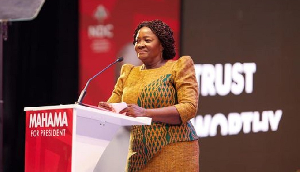Business News of Wednesday, 23 January 2013
Source: Daily Guide
Tourism levy to bag GH¢8million
Revenues from the Tourism Levy are estimated to reach over GH¢8 million by October this year, officials of the Ghana Tourism Authority (GTA) have said.
The estimated amount is expected to come from some 457 star-rated hotels – hotels with exceptional services and facilities beyond the normal bed and breakfast across the country.
The Deputy Chief Executive Officer (CEO) of the Ghana Tourism Authority, Mr Samson Donkor. who disclosed this in an interview to the GRAPHIC BUSINESS in Accra said the authority had since October 1, 2012 to date collected GH¢240,254 from 38 of such hotels.
The Tourism Levy is one per cent of a person’s total expenditure at a tourism enterprise such as a hotel, conference center, beach, drinking spot among others. It is to be collected by the operators of the star-rated enterprises and forwarded to the GTA, the regulator of the local tourism industry.
Although 273 star-rated hotels have so far registered to collect the levy, the deputy CEO at GTA said only 38 of them had duly complied with the collection.
The authority is currently using persuasion and dialogue to get the rest to comply despite having the power to prosecute defaulters, Mr Donkor said, explaining that “it is to early to rush into applying sanctions. We want to proceed with the implementation gradually so that we can get every stakeholder to buy into it.”
By his estimation, the GTA is expecting to raise about GH¢3 million in three months and reach between GH¢8 million and GH¢9 million by October, a year into the implementation.
Further estimates, he said, showed that the star-rated facilities would account for more than 80 per cent of the total amount to be collected from the levy, hence the authority’s strategy to deal with them first.
Hospitality service providers such as hotels, conference centers, beach operators and restaurants which are affected by the levy are to register with the GTA to enable them deduct the necessary amount from their patrons’ expenses to be paid into a common account, the Tourism Levy Account.
The deputy CEO said GTA has designated the Agriculture Development Bank (ADB) as the receiving bank for all collections.
Each registered facility is, however, given a distinct number with which it uses to make payments into the ADB account, the deputy CEO said.
“The system is such that we can sit here (referring to GTA’s offices) and monitor who is making payments and who is not,” Mr Donkor said.
The levy is one of the sources of funding for the newly created Tourism Development Fund provided for in the revised Tourism Act, 2011, (Act 817).
According to the act, monies from the fund would be used for the marketing, promotion and development of tourist sites and related infrastructure, building the capacity of stakeholders in the sector and funding of research works in tourism among others.
Although the implementation of the levy was envisaged to come with some resistance from hospitality service providers and the general public, the deputy CEO of the Tourism Authority said the affected institutions have so far cooperated fully.
The collection of the levy is, however, not without some challenges, as compliance from the lower market end of the market has not been encouraging.
“It is the lower market that we have a problem with. This is in reference to drinking spots, restaurants, beaches and the like,” Mr Donkor said.
He called on the relevant stakeholders to cooperate with the authority in easing the challenges associated with the implementation and collection process.
While commending the logic behind the introduction of the levy, the General Manager of the Coconut Grove Regency Hotel in Accra, Mr Ralph Ayitey, said the Tourism Authority ought to use money accruing from the levy to develop the sector instead of limiting it to the institution.
“For me as a manager, I’m ok with it. The problem, however, is what will the money be used for?”
He said the Tourism Authority should not see it as a fund for them to use in developing themselves to the neglect of key things such as human resource development, provision of access roads to tourist sites and constant electricity and water supply to hotels,” Mr Ayitey said.
Entertainment









